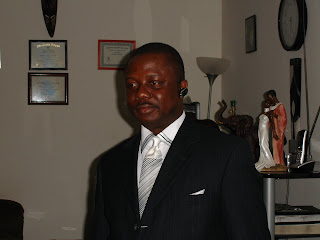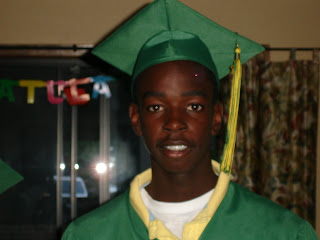
Sierra Leone lost a lot during the ten year civil war in the country. At the end of the colonial era and the decade immediately following independence, a lot of effort was made by government and christian missions to build schools in the hinterlands of Sierra Leone, with a view to addressing the educational disparities or imbalances that existed between the Western Area of Freetown and its suburbs and the rest of the country.
Educational disparities between the hinterlands and the western area was not a deliberate policy of the colonialists, but a result of the unique history of Sierra Leone. The original colony was comprised of lands that had been obtained by the British from local chiefs around the western coastal areas that later became t Freetown and its Peninsula. These lands, obtained by dubious treaties at best, became the home of freed slaves and
recaptives and represented the Sierra Leone colony. Freetown was the capital and the other Peninsula settlements were named after British towns, thus giving rise to towns such as Leicester, Gloucester, Regent, Waterloo,
Goderich, Hastings, and so on. The colonialists built schools and institutions of higher learning to encourage and enable the freed settlers, who collectively became the
Krios, to partake to some extent in the administration of the colony, mainly at the clerical and clergy levels.
When Africa was partitioned by the Europeans, the British, French and Liberian governments delineated frontiers of influence that awarded the rest of the provincial areas of Sierra Leone as we know it today to the British Crown. In 1896, the
British declared the hinterlands of Sierra Leone as a protectorate, allowing the
indigenes to keep their traditional rulers, but requiring subservience from these rulers and requiring the
indigenes to pay taxes to the colonialists. The colonialists imposed a hut tax to raise money for the administration of the protectorates. Some chiefs could not understand why they had to pay taxes to outsiders for their own lands and in 1898, one such chief,
Bai Bureh, revolted leading to the hut tax war. The colonialist eventually prevailed and Sierra Leone became divided into the colony and the protectorates with different forms of administration. The British built government schools for the sons and nominees of paramount chiefs in the protectorates and christian missionaries built some, but government educational focus was largely devoted to the areas of the colony.
After independence in 1961, the new Sierra Leone government sought the help of christian missions to broaden the delivery of education in the hinterlands by building more schools. Wesley Secondary School
Segbwema, in the Eastern Province of Sierra Leone was one of these schools. The school was built in the early 60s by the Methodist Church and the original teachers were British missionaries and the few natives that had acquired western education. With time, the American Peace Corps and the British Voluntary Service Organisation (
VSO) provided most of the graduate teachers at Wesley. As more native Sierra
Leoneans graduated from colleges and returned home to teach, the
administration of Wesley was gradually handed over to them. The Peace corps continued at Wesley into the late 70s.
I attended Wesley Secondary school in the late 80s when all the the teacher were indigenous Sierra
Leoneans. The school principal at the time was the Rev. Kenneth Paul
Ganna Conteh, an educational pioneer and excellent administrator, who was a graduate of
Fourah Bay College. The Vice Principal then was Mr. John T.
Jusu, who taught me maths. Mr
Jusu was a very talented man. He was a photographer and had an amplifier set that played in
Segbwema and its environs. He built most of his speakers by hand. He also played videos at night at the old
GBO, now St. Peters hall where we went at night if we had money and few assignments.
Wesley in those days was an excellent school with talented and dedicated teachers. My favorite teachers were Mr. E. K.
Bundeh, Mr.
Ansumana Gbonnoh, Mr.
Jusu Lahai, Mrs. Mamie
Aruna, Ms. Betty
Kallay, Mr. A. A Sam, Mr.
Abdulai Masiyanday Bangura, Mr Adonis
Kanneh, Mr. Steven, Mr.
Senesie Samai, Mr. Sam
Vella, Mr.
Gershon McCarthy, Mr. Paul
Songa, Mr.
Bockarie Jimmy, Mr. Mohamed
Mustapha (
Rasta)and of course our vice
pricipal JTJ. These men and women represent the purest and noblest breed of teachers I have ever had the opportunity to learn under.
Wesley instilled in me the discipline to academically challenge myself. I learnt self confidence and the desire to be second to none. The special thing about Wesley is that the friends I acquired while in school there are still the closest friends I have. Friends like
Ansu Gbonnoh, Kenneth
Conteh, Jr., Michael
Yambasu,
Abdulai Bangura,
Sallieu Bah,
Musa Boima, Amara
Songa, Dennis
Conteh, Michael
Abdulai,
Kalilu Foday, John
Baimba, Samuel
Mansaray, Kenneth
Vandi, Edward Shaka,
Isha Conteh, Mohamed
Conteh, and many others have a special place in my heart.
Wesley was badly destroyed during the war. I however, had the good luck of coming across some pictures of the school in the 70s taken by a
VSO teacher, Mr. Miles
Snowdon. Miles taught as a
VSO volunteer in Wesley from 1973-74. He took some wonderful pictures that I am reproducing here. The pictures show how dynamic the school was even in the early 70s. The man in the brown Suit is the late Rev K. P.
Conteh, then a young man. The lady, Ms. Janet Bio, was a nursing supervisor (Sister) at the Nixon Memorial Hospital
Segbwema. A teaching and research hospital established by the Methodist Mission that was among one of the best hospitals in Sierra Leone. I know this because that is where I was born with all limbs intact.
Segbwema was a bastion of resistance to the marauding
RUF rebels, but the town was overrun and severely destroyed after the Johnny Paul/Sam
Bockarie Junta was chased out of
Freetown by
Ecomog. I wish to thank Mr. Miles
Snowdon for these wonderful pictures of my beloved Wesley. The Vice Principal Mr John T.
Jusu, died after the war from "natural" causes, after spending most of the 90s as a refugee in
Kenema. Wesley has started to get back on its feet and requires considerable assistance. Old students,
don't forget this once great school.














 Last June was reserved for school graduations. The Johnson, Momoh, Saidu and Massaquoi families and many other Sierra Leonean families in Minnesota and across the USA were grateful and ecstatic to see their sons and daughters graduate from high school and get ready for college.
Last June was reserved for school graduations. The Johnson, Momoh, Saidu and Massaquoi families and many other Sierra Leonean families in Minnesota and across the USA were grateful and ecstatic to see their sons and daughters graduate from high school and get ready for college.
































































